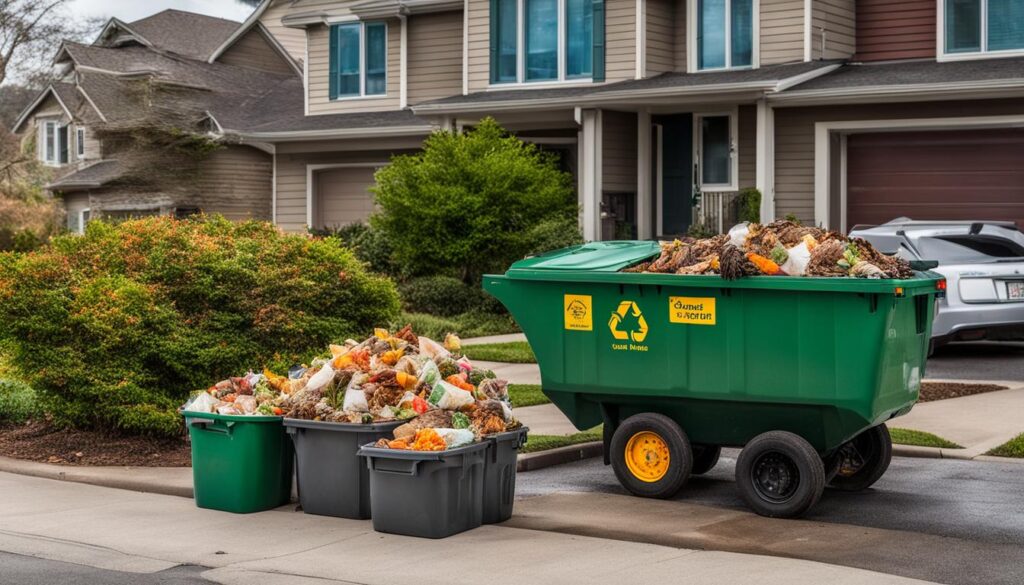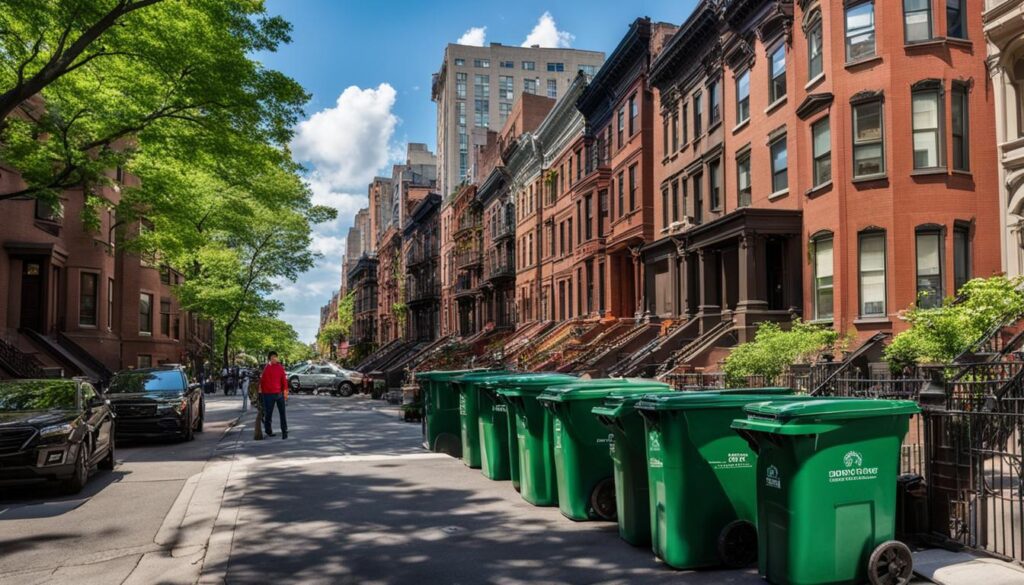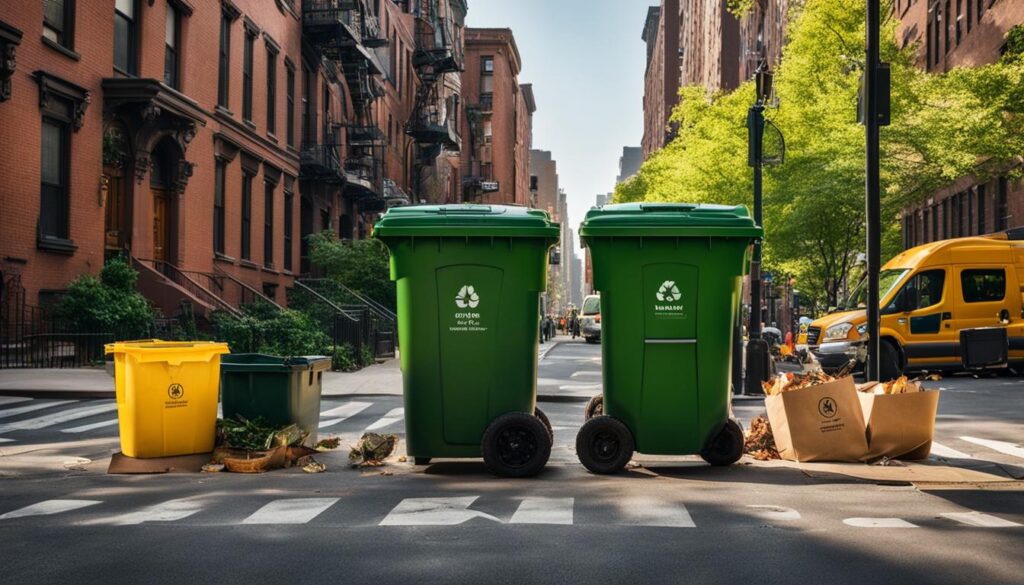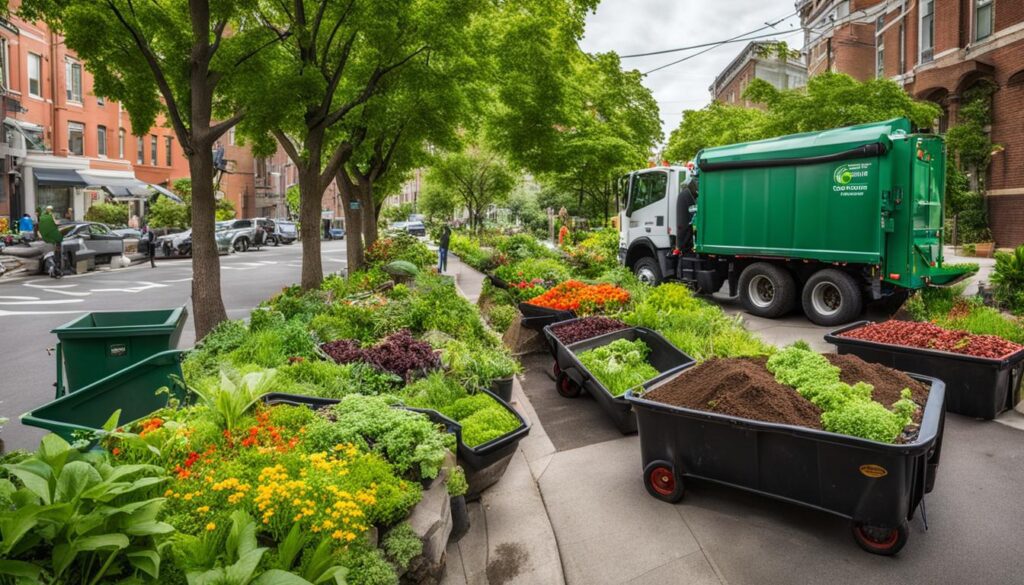Curbside composting is a revolutionary way to manage waste and make a positive impact on the environment. While not widely available in all areas, it offers numerous benefits, such as reducing landfill waste and nurturing gardens. By exploring curbside composting options and finding alternative solutions, you can play an active role in sustainable waste management.
Key Takeaways:
- Curbside composting is a sustainable waste management solution.
- It helps reduce landfill waste and improve soil quality.
- Finding alternative composting options is important if curbside composting is not available in your area.
- Participating in composting programs can make a significant impact on the environment.
- Embracing curbside composting is a step towards a greener lifestyle.
The Dirt on Curbside Composting in Texas
In the state of Texas, the availability of curbside composting services is limited, with only Austin and San Antonio offering this eco-friendly waste management solution. However, other cities such as Fort Worth, Houston, and Arlington have initiated pilot programs or provide compost pickup for yard waste only. These programs involve a comprehensive process that includes sorting the waste, grinding it, and distributing the organic material to contractors, landscapers, and home gardeners.
While participation rates in these programs vary, some cities have implemented mandatory composting to encourage greater involvement. The aim is to boost the diversion of organic waste from landfills and promote sustainable waste management practices across the state.
As part of these initiatives, residents are provided with convenient curbside pickup services for their organic waste. By taking advantage of these composting programs, Texans can contribute to the reduction of landfill waste, promote organic waste recycling, and support the creation of nutrient-rich fertilizer for gardens and landscapes.
Let’s take a closer look at the cities in Texas that offer or are exploring curbside composting options:
| City | Curbside Composting Availability |
|---|---|
| Austin | Available |
| San Antonio | Available |
| Fort Worth | Pilot Program |
| Houston | Pilot Program |
| Arlington | Yard Waste Only |
While curbside composting is a viable solution for many, there may be alternative options for those who do not have access to this service. These alternatives include finding a compost buddy to share composting responsibilities, practicing composting at home using techniques like vermicomposting or bokashi, or signing up for private pickup services offered by companies like Moonshot Compost or Happy Earth Compost. With these alternatives, individuals can still actively participate in organic waste recycling and contribute to sustainable waste management.
The Benefits of Composting
Composting is a simple yet effective solution to address the environmental challenges posed by food waste. In the United States, a significant amount of food is wasted each year, contributing to greenhouse gas emissions and landfill waste. By participating in composting, whether through backyard composting or curbside pickup programs, you can actively contribute to food waste recycling and make a positive impact on the environment.
One of the key benefits of composting is the accelerated breakdown of food waste. Instead of allowing food to rot in landfills, composting allows it to decompose more quickly, reducing methane emissions. The resulting compost is a nutrient-rich fertilizer that can be used to enhance soil quality, improve water retention, and promote healthier plant growth. By incorporating compost into your garden or landscaping, you can reduce the need for chemical fertilizers and pesticides, making your outdoor spaces more sustainable.
Composting also helps to divert waste from landfills, reducing the strain on these already limited resources. When food waste is diverted to composting facilities or backyard compost bins, it minimizes the amount of trash that ends up in landfills and reduces the production of harmful greenhouse gases, such as methane. This not only helps to combat climate change but also extends the lifespan of landfills, preserving valuable land for other purposes.
| Benefits of Composting | Curbside Composting | Backyard Composting |
|---|---|---|
| Reduces greenhouse gas emissions | ✔️ | ✔️ |
| Improves soil quality | ✔️ | ✔️ |
| Reduces the need for chemical fertilizers | ✔️ | ✔️ |
| Diverts waste from landfills | ✔️ | ✔️ |
| Enhances water retention | ✔️ | ✔️ |
Whether you choose curbside composting or backyard composting, both options allow you to actively participate in food waste recycling. Curbside composting programs make it convenient for individuals to dispose of their food scraps, while backyard composting provides an opportunity for homeowners and gardeners to create their own nutrient-rich compost. By embracing these methods, you can take a proactive approach towards sustainable waste management and contribute to a greener future.
Challenges and Alternatives to Curbside Composting
While curbside composting is a desirable solution for sustainable waste management, it may not be accessible to everyone, especially those living in apartment buildings or larger complexes. This limitation poses logistical challenges for expanding composting initiatives, but there are alternative options available to individuals who are committed to reducing their environmental footprint.

One alternative to curbside composting is finding a compost buddy. This involves connecting with a neighbor or community member who has a backyard and is willing to share their compost pile. By contributing your organic waste to their compost pile, you can still participate in the composting process and divert it from ending up in landfills. This option fosters a sense of community and shared responsibility for sustainable waste management.
Another alternative is to compost at home using techniques like vermicomposting or bokashi. Vermicomposting involves using worms to break down food scraps and other organic materials, while bokashi is a fermented composting method. Both options are suitable for small spaces and produce nutrient-rich compost that can be used in gardens or potted plants. Many resources and tutorials are available online to guide beginners through the process.
If curbside composting or home composting is not feasible, signing up for private pickup services offered by companies like Moonshot Compost or Happy Earth Compost is another option. These companies specialize in residential compost pickup and provide convenient and reliable waste management services. While they may involve an additional cost, they offer a convenient solution for individuals who cannot participate in curbside composting programs.
Table: Comparing Alternatives to Curbside Composting
| Alternative | Pros | Cons |
|---|---|---|
| Compost Buddy | – Sharing resources – Fostering community – Reducing landfill waste | – Limited availability – Dependent on neighbor cooperation |
| Vermicomposting | – Suitable for small spaces – Produces nutrient-rich compost – Educational and rewarding | – Requires purchasing worms – Requires regular maintenance – Slow decomposition process |
| Bokashi Composting | – Suitable for small spaces – Fermentation speeds up decomposition – Odor-free process | – Requires purchasing bokashi bran – Requires regular maintenance – More complex process |
| Private Pickup Services | – Convenient and reliable – No need for personal setup – Professional waste management | – Additional cost – Limited service availability – Less community involvement |
While curbside composting may not be accessible for everyone, exploring these alternatives enables individuals to actively participate in green waste disposal and contribute to sustainable waste management. By choosing the most suitable option for your circumstances, you can make a positive impact on the environment and help reduce landfill waste.
Curbside Composting in New York City
New York City is gradually implementing a citywide curbside composting program, with the aim of making it mandatory for all residents by 2025. Composting in NYC is seen as crucial in fighting climate change, reducing methane emissions, and improving soil health. The program includes the distribution of composting bins and smart compost bins for public use.

Curbside Composting in NYC
The curbside composting program in New York City is part of the city’s broader sustainability efforts. By diverting organic waste from landfills, the program aims to reduce greenhouse gas emissions and contribute to a more circular economy. Residents are provided with composting bins for food scraps and yard waste, which are collected separately from regular trash.
The distribution of composting bins encourages residents to actively participate in composting and take responsibility for their organic waste. This approach not only reduces the amount of waste going to landfills but also creates nutrient-rich compost that can be used to enrich soil and support local urban agriculture.
Benefits of Curbside Composting
Curbside composting offers numerous benefits for both individuals and the environment. By participating in the program, residents can actively contribute to food waste recycling, reducing landfill waste, and improving soil quality. Composting helps to divert organic waste from landfills, where it would otherwise produce harmful methane gas, a potent greenhouse gas contributing to climate change.
The resulting compost can be used to enrich soil, improve water retention, and promote healthier plant growth. It helps to restore nutrients to the earth, support urban gardening initiatives, and reduce the need for chemical fertilizers. Curbside composting not only benefits individual households but also contributes to a greener, more sustainable future for New York City as a whole.
Getting Started with Curbside Composting in NYC
Curbside composting in New York City offers residents a convenient way to recycle their organic waste and contribute to sustainable waste management. To get started with curbside composting in NYC, you don’t need to acquire special brown bins from the city. Any container with a capacity of 55 gallons or less and a tight lid can be used. This flexibility allows residents to use bins they already have or choose containers that suit their needs.
Accepted materials for composting include food scraps, such as fruits, vegetables, coffee grounds, bread, and pasta, as well as leaf and yard waste. These organic materials break down into nutrient-rich compost that can be used to nourish plants and gardens. However, it’s important to note that certain items should not be placed in the compost bin, including plastic, glass, cartons, and pet waste. These items can contaminate the compost and hinder the composting process.
By participating in curbside composting, you can help reduce the amount of waste that ends up in landfills, where it produces harmful greenhouse gas emissions. Instead, the organic waste is turned into valuable compost that enriches the soil and promotes healthy plant growth. It’s a simple but impactful way to contribute to a greener and more sustainable future.

| Accepted Materials for Curbside Composting in NYC |
|---|
| Food scraps (fruits, vegetables, coffee grounds, bread, pasta) |
| Leaf and yard waste |
How Curbside Composting Works in NYC
Curbside composting in New York City is a crucial part of the city’s sustainable waste management efforts. To understand how this process works, let’s dive into the details:
Curbside Compost Pickup
In NYC, curbside composting is collected on the same day as recycling. The Department of Sanitation operates dual-bin trucks with separate compartments for recycling and compost. These trucks follow specific pickup schedules and routes that may vary depending on the density of the district.
For high-rise buildings or complexes, property management is responsible for collecting and setting out the compost bins for pickup, ensuring all residents can participate in the program. This collaborative effort helps maximize composting participation in densely populated areas.
Smart Compost Bins
The city also provides smart compost bins for public use, making it even more convenient for residents to compost their organic waste. These smart compost bins are equipped with technology that monitors and moderates the composting process, ensuring optimal conditions for decomposition. An accompanying app allows residents to track their composting activity and receive helpful tips and information.
By offering dual-bin trucks and smart compost bins, NYC aims to streamline the curbside composting process and encourage more residents to participate in green waste disposal.

The Impact of Curbside Composting
Curbside composting plays a vital role in reducing landfill waste and improving soil health. By diverting organic waste from landfills, the process helps mitigate the release of harmful greenhouse gases, such as methane, which contributes to climate change.
The compost produced from curbside composting is a valuable resource for enhancing soil quality, increasing water retention, and promoting plant health. It provides essential nutrients for plants and improves their resistance to diseases and pests. This creates a more sustainable and productive environment for urban gardening and agriculture.
| Benefits of Curbside Composting in NYC | Impact |
|---|---|
| Reduces landfill waste | Diverts organic waste from landfills, reducing greenhouse gas emissions. |
| Improves soil quality | Produces nutrient-rich compost that enhances soil fertility, water retention, and plant growth. |
| Encourages sustainable gardening | Enables residents to grow healthy plants and vegetables using compost for urban gardening. |
Curbside composting is a sustainable and effective solution for minimizing waste and nurturing a greener urban environment in NYC.
Conclusion
Curbside composting is an innovative and sustainable approach to waste management that has the potential to create significant positive change. Although it is not yet widely available in all areas, more cities are gradually implementing curbside composting programs. By actively participating in these programs and exploring alternative options, such as residential composting or finding compost buddies, individuals can contribute to reducing landfill waste and embracing a greener lifestyle.
Urban composting plays a crucial role in sustainable waste management, as it helps divert organic waste from landfills and reduces greenhouse gas emissions. Through the process of composting, food waste and other organic materials can be transformed into nutrient-rich fertilizer that enhances soil quality and promotes healthy plant growth.
Embracing curbside composting and other forms of urban composting is not only environmentally beneficial but also an opportunity for individuals to take an active role in creating a greener future. By participating in these initiatives, you can contribute to the preservation of natural resources, reduction of waste, and the overall well-being of our planet. Together, let’s revolutionize waste and create a more sustainable future through curbside composting and urban composting practices.
FAQ
What is curbside composting?
Curbside composting is a waste management practice that involves separating organic waste, such as food scraps and yard waste, from regular trash. The waste is then collected by a compost pickup service and processed into nutrient-rich compost.
How does curbside composting benefit the environment?
Curbside composting helps reduce landfill waste, which contributes to greenhouse gas emissions. It also creates nutrient-rich fertilizer that can enhance soil quality, improve water retention, and reduce plant diseases and pests.
Is curbside composting available everywhere?
No, curbside composting is not widely available in all areas. Its availability varies by city, with some cities offering full curbside compost pickup, while others have pilot programs or only collect yard waste. Alternative options like backyard composting or private pickup services can be explored if curbside composting is not available.
What materials can be composted through curbside composting?
Accepted materials for curbside composting typically include food scraps, fruits, vegetables, coffee grounds, bread, pasta, leaf and yard waste, and more. However, certain items like plastic, glass, cartons, and pet waste should not be placed in the compost bin.
Can I participate in curbside composting in NYC without special bins?
Yes, residents in NYC can participate in curbside composting using any container with a capacity of 55 gallons or less and a tight lid. Special brown bins from the city are not required.
How does curbside composting work in NYC?
Curbside composting in NYC is collected on the same day as recycling. The Department of Sanitation uses dual-bin trucks with separate compartments for recycling and compost. Pickup schedules and the number of trucks vary depending on the district. For high-rise buildings, property management is responsible for collecting and setting out compost for pickup.
Are there alternatives to curbside composting?
Yes, if curbside composting is not available, alternative options include finding a compost buddy, composting at home using techniques like vermicomposting or bokashi, or signing up for private pickup services offered by companies like Moonshot Compost or Happy Earth Compost.
How can I get started with curbside composting in NYC?
To get started with curbside composting in NYC, residents can separate their food scraps and yard waste from regular trash. Any container with a capacity of 55 gallons or less and a tight lid can be used. The city also distributes composting bins and smart compost bins for public use.